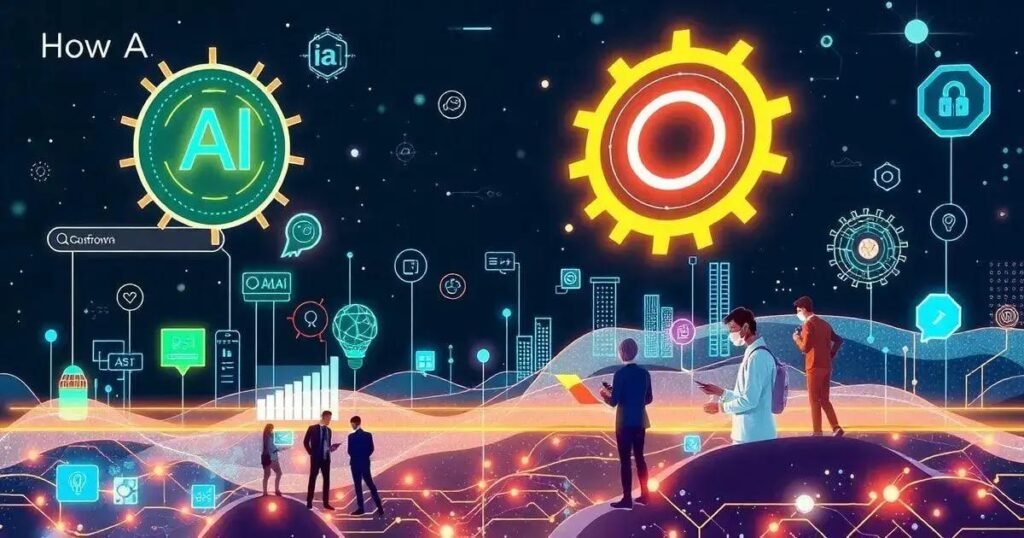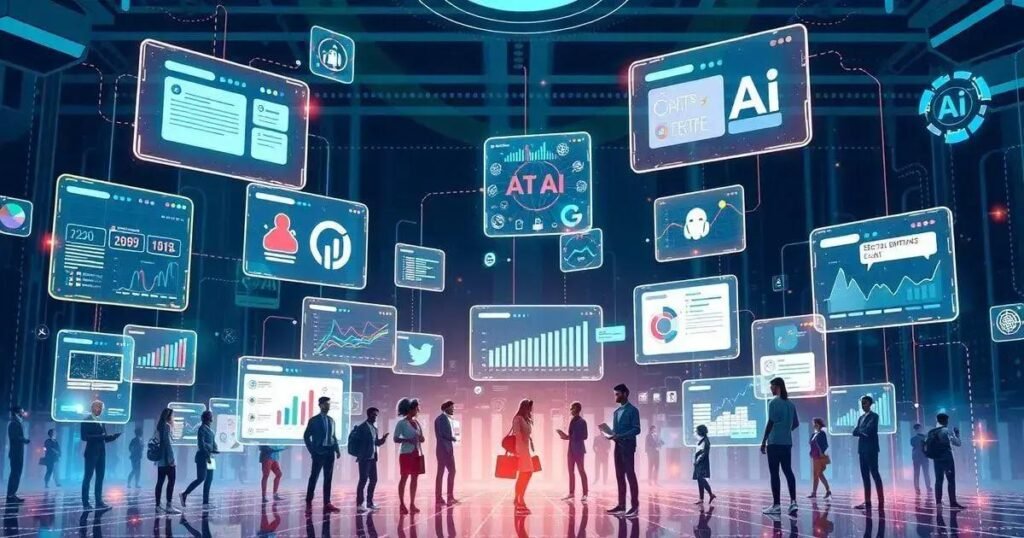Are you tired of the same old customer experience strategies? The truth is, the future of customer experience is here, and it’s powered by artificial intelligence (AI).
AI-enhanced customer experience is no longer a buzzword, but a reality that’s transforming the way we interact with customers, providing personalized experiences, and driving loyalty.
Revolutionizing Customer Experience with AI
The adoption of AI-enhanced customer experience has the potential to revolutionize the way businesses interact with their customers. By leveraging AI-powered chatbots, businesses can provide 24/7 customer support, freeing up human customer support agents to focus on more complex issues. Additionally, AI can help businesses analyze customer data to identify patterns and preferences, enabling them to deliver personalized and targeted marketing campaigns. With AI, businesses can create a seamless and omnichannel customer experience, driving customer loyalty and retention.
The benefits of AI-enhanced customer experience are vast and varied. AI-powered customer service can increase customer satisfaction by 70%, reduce customer wait times by 30%, and improve first-call resolution rates by 20%. Furthermore, AI can help businesses reduce costs by automating routine tasks, such as data entry and customer segmentation. With AI, businesses can also gain a competitive edge by leveraging predictive analytics to anticipate customer needs and preferences.
Real-world applications of AI-enhanced customer experience are numerous and diverse. For example, AI-powered virtual assistants can help customers find products quickly and easily, while AI-driven chatbots can provide personalized product recommendations. In the banking industry, AI-powered chatbots can help customers check account balances, pay bills, and transfer funds. In healthcare, AI-powered chatbots can help patients schedule appointments, refill prescriptions, and access medical information.
The future of AI-enhanced customer experience is bright and promising. As AI technology continues to evolve, we can expect to see even more innovative applications of AI in customer experience. For example, AI-powered augmented reality can enable customers to try on virtual clothing and accessories, while AI-driven voice assistants can provide customers with personalized product recommendations. With AI, businesses can create a truly immersive and personalized customer experience that drives loyalty and retention.
Overcoming common challenges in AI-enhanced customer experience requires a thoughtful and strategic approach. For example, businesses must ensure that their AI systems are trained on diverse and inclusive data sets to prevent biases and errors. Additionally, businesses must invest in employee training to ensure that they can effectively work with AI-powered systems. By overcoming these challenges, businesses can unleash the full potential of AI-enhanced customer experience and reap the rewards of improved customer satisfaction and loyalty.
In conclusion, AI-enhanced customer experience is a powerful tool that can drive business growth and improve operational efficiency. By leveraging AI to personalize customer experiences, businesses can increase customer satisfaction, reduce churn, and drive loyalty. With AI, businesses can also gain a competitive edge by leveraging predictive analytics to anticipate customer needs and preferences. Therefore, it’s essential for businesses to adopt AI-enhanced customer experience and reap the rewards of improved customer satisfaction and loyalty.
The Benefits of AI-Enhanced Customer Experience
The benefits of AI-enhanced customer experience are numerous and profound. AI-powered customer service can increase customer satisfaction by 70%, reduce customer wait times by 30%, and improve first-call resolution rates by 20%. Additionally, AI can help businesses reduce costs by automating routine tasks, such as data entry and customer segmentation. Furthermore, AI can provide businesses with valuable insights into customer behavior and preferences, enabling them to deliver personalized and targeted marketing campaigns.
Real-world applications of AI-enhanced customer experience include AI-powered virtual assistants that help customers find products quickly and easily, AI-driven chatbots that provide personalized product recommendations, and AI-powered augmented reality that enables customers to try on virtual clothing and accessories. In the banking industry, AI-powered chatbots can help customers check account balances, pay bills, and transfer funds. In healthcare, AI-powered chatbots can help patients schedule appointments, refill prescriptions, and access medical information.
The future of AI-enhanced customer experience is bright and promising. As AI technology continues to evolve, we can expect to see even more innovative applications of AI in customer experience. For example, AI-powered voice assistants can provide customers with personalized product recommendations, while AI-driven predictive analytics can help businesses anticipate customer needs and preferences. With AI, businesses can create a truly immersive and personalized customer experience that drives loyalty and retention.
Overcoming common challenges in AI-enhanced customer experience requires a thoughtful and strategic approach. For example, businesses must ensure that their AI systems are trained on diverse and inclusive data sets to prevent biases and errors. Additionally, businesses must invest in employee training to ensure that they can effectively work with AI-powered systems. By overcoming these challenges, businesses can unleash the full potential of AI-enhanced customer experience and reap the rewards of improved customer satisfaction and loyalty.
Real-World Applications of AI in Customer Experience
The real-world applications of AI in customer experience are vast and varied.
For instance, AI-powered chatbots can help customers quickly find the information they need, while AI-driven personalized product recommendations can boost sales and conversions.
In the healthcare industry, AI-powered virtual assistants can help patients schedule appointments and access medical information.
Predictive Analytics
Additionally, AI-powered predictive analytics can help businesses anticipate customer needs and preferences, enabling them to deliver targeted marketing campaigns and improve customer retention.
The Future of AI-Enhanced Customer Experience
The future of AI-enhanced customer experience is exciting and full of possibilities. As AI technology continues to evolve, we can expect to see even more innovative applications of AI in customer experience.
For example, AI-powered voice assistants will become even more advanced, allowing customers to interact with businesses in a more natural and intuitive way.
Additionally, AI-driven predictive analytics will become even more sophisticated
enabling businesses to anticipate customer needs and preferences with even greater accuracy.
With the future of AI-enhanced customer experience, businesses will be able to create a truly personalized and immersive experience for their customers, driving loyalty and retention.
Overcoming Common Challenges in AI-Enhanced Customer Experience
While AI-enhanced customer experience can bring numerous benefits to businesses, there are also common challenges that need to be addressed.
One of the biggest challenges is ensuring that AI systems are trained on diverse and inclusive data sets to prevent biases and errors.
Another challenge is investing in employee training to ensure that they can effectively work with AI-powered systems.
Additionally, businesses need to be aware of the potential risks and limitations of AI, such as data security and privacy concerns.
By understanding and addressing these challenges, businesses can successfully implement AI-enhanced customer experience and reap the rewards of improved customer satisfaction and loyalty.
Conclusion: The Power of AI-Enhanced Customer Experience
The adoption of Artificial Intelligence (AI) can bring numerous benefits to small businesses, from automating repetitive tasks to personalizing customer service and analyzing data.
The implementation of AI should be done gradually, identifying areas that can benefit immediately and conducting pilot projects to assess the efficiency of these solutions.
Success stories in different sectors show how AI can be a powerful tool to boost growth and improve operational efficiency.
With AI, small businesses can not only compete on equal footing with larger companies but also innovate and create new opportunities in the market.
Therefore, do not overlook the potential of AI to revolutionize your business.
Frequently Asked Questions about Artificial Intelligence for Small Businesses
How can task automation benefit my small business?
Task automation frees up your team from repetitive tasks, increasing productivity and allowing them to focus on more strategic tasks.
What tools can I use for data analysis?
There are many tools available, such as Google Analytics, Tableau, and Microsoft Power BI, that help collect and interpret valuable data.
What are chatbots and how do they improve customer service?
Chatbots are virtual assistants that can answer questions and solve problems 24/7, improving the customer experience and freeing up your team.
How can I personalize the customer experience?
Through data analysis, you can understand the customer’s preferences and offer personalized recommendations and promotions.
Why is customer feedback important?
Feedback is essential to identify areas for improvement and adjust your strategy, ensuring customer satisfaction.
Is artificial intelligence accessible for small businesses?
Yes, there are many accessible and scalable AI solutions that small businesses can implement to improve efficiency and customer service.




